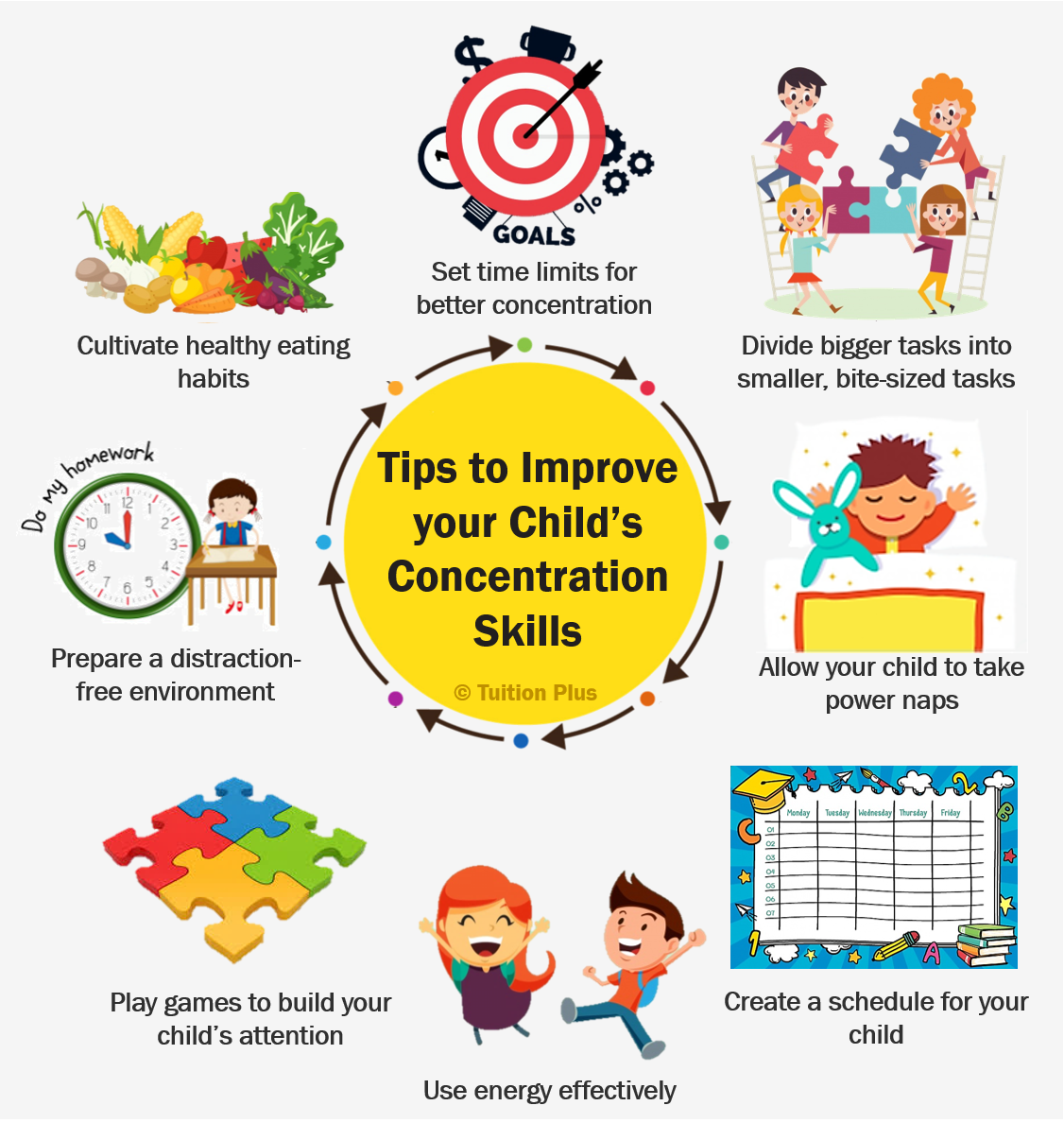Children are naturally curious with unmatchable energy. It is often challenging to get a child to focus on his homework without getting too distracted. Here are 8 tips to improve your child’s concentration skills.

1. Set time limits for better concentration
On average, a child can concentrate on an activity for about 30 minutes1. Set a time limit for your child to complete a certain goal, so as to train your child's concentration skills. For instance, you can tell your child that a certain number of pages of his homework needs to be completed within twenty minutes.
In determining the appropriate time limit, think about past references (i.e. how long did your child take to complete a similar task?). The time limit can then be adjusted accordingly depending on your child's progress. Alternatively, you can also start with the end goal in mind (e.g. X number of pages to be completed within 15-20 minutes.)
1 This refers to the attention span of a child around 6-7 years of age. Individual attention span may vary, depending on the type of activity, age and personality.
2. Divide bigger tasks into smaller, bite-sized tasks
Children tend to lose focus when faced with a difficult task. To help your child, divide the task into smaller ones. By doing so, your child will feel a sense of accomplishment upon completing the small task. This will motivate him to continue, thereby improving his attention span.
If your child finds it difficult to study the whole chapter, break it down into pages or sections. After each section, do a quick review of the concepts to test his understanding. Similarly, if you want your child to help out with the household chores, start by letting him try a small part of it. For example, you could ask him to clean the bottom shelf of his toy cupboard. Once that is done, let him try cleaning the middle shelf. This works better as compared to asking him to clean the whole toy cupboard – he may dread it or might even start to procrastinate.
3. Allow your child to take power naps
A power nap for 20 minutes after school or in the afternoon helps to boost concentration. After a long day of activities, it is important to let your child take naps or breaks to recharge his energy.
4. Create a schedule for your child
A schedule helps to enforce discipline in your child, while improving his concentration skills. On a daily basis, you can specify a routine for your child to follow (see example below).
3.30pm – Take a shower
3.45pm – Do homework
5pm – Watch tv
6pm – Eat dinner
With a schedule, your child will be able to learn the importance of time management. It also helps to increase concentration as your child will need to focus in order to complete his task within the specified time.
5. Use energy effectively
Some children have high energy levels in the mornings while others have high energy in the evenings. Make the most out of your child’s energy levels by letting him perform challenging tasks during his ‘high energy’ period and switch to lighter activities thereafter. By doing so, your child will be able to focus better on the task at hand.
6. Play games to build your child’s attention
Games help to stimulate a child’s mind. To improve your child’s concentration, let him solve crossword and jigsaw puzzles, play memory games, or even ‘Uno’. Picture puzzles – in which your child has to compare two pictures and look for things that are ‘different’ – would also help to sharpen his focus.
7. Prepare a distraction-free environment
A distraction-free environment involves three aspects:
- Gadgets – Ideally, gadgets should be kept in a different room to avoid distractions. Your child should not be able to ‘see’ any gadgets – tablets, cell phones, or the television – when he is studying.
- Ambience – Soft lighting and/or instrumental music helps to set the mood for studying.
- Materials – All stationery – pens, crayons, textbooks, pencils – and necessities such as water should be placed on the table or within your child’s reach. By having everything on the table, your child will be able to maintain full focus on the task at hand.
8. Cultivate healthy eating habits
A child’s concentration level is affected by his diet. Junk food or food with high sugar content makes a child sluggish, while food rich in proteins (e.g. eggs, lean meat and almonds) increases concentration levels. In addition, vegetables and fruits provide great antioxidants which can boost your child’s brain power.
If possible, try not to let your child drink too much 3-in-1 coffee, tea or caffeinated energy drinks. Such drinks may contain an unhealthy dose of sugar, which can lead to a “crash” of energy thereafter.
Apart from the above tips, what else can you do to improve your child’s concentration? Perhaps you can understand more about your child’s learning style. Click here to find out more.
 WhatsApp +65 9221 9078 |
WhatsApp +65 9221 9078 | 

